City Will Contribute $9 Million To Huge Bay View Development
Plus: Atid Properties sells portfolio and a recap of week's real estate news.
The Department of City Development (DCD) is proposing to subsidize the largest private affordable housing development in state history.
The city would allocate $9.2 million of incremental property tax revenue to support Bear Development‘s redevelopment of the Filer & Stowell site on the northern edge of Bay View into an eight-building, 576-unit complex.
The Redevelopment Authority of the City of Milwaukee will consider the proposal at its Aug. 17 meeting. The Common Council will also need to adopt the proposal.
Bear’s primary financing source is federal low-income housing tax credits. The program, the most common affordable housing mechanism in Wisconsin, requires specific units to be set aside to qualifying households at rates targeted not to exceed 30% of a household’s income.
A mix of one and two-bedroom units would be set aside for households making no more than 40%, 50%, 60%, 70% and 80% of the regional median income. The majority (418) of the units would be set aside at the 60% or below income thresholds. According to a chart presented by Bear at a May meeting, a one-bedroom unit for an individual making $32,000 or less (40%) would cost $644 per month. A one-bedroom unit for an individual making no more than $64,000 (80%) would cost $1,394. Income limits increase as household size increases.
The city subsidy would be structured as a developer-financed tax incremental financing (TIF) district. The structure works effectively as a property tax rebate, with a fixed amount of increased property tax revenue generated by the development being returned to the developer over a period of no more than 27 years (often capped at a shorter time period). The city has increasingly used the structure to close financing gaps in affordable housing developments.
According to a DCD representative, specific details on the proposal will be released closer to the meeting.
Area Alderwoman Marina Dimitrijevic convened a public meeting on the project in May because Bear’s plans had shifted substantially from its 2020 proposal to redevelop the former factory campus.
“Personally, I think that something should happen there. It’s better than vacant land,” she told the audience. “We keep hearing that people are concerned about the continually rising prices for housing in Bay View, especially for seniors.”
Citing their poor condition and the layout of the site, Bear now intends to demolish all of the buildings. Additionally, 144 of the apartments would be set aside for seniors (individuals 55 or older) and a public connection between the two separate sections of the Kinnickinnic River Trail would be established.
“We really wanted to reuse [the buildings], create the next life for them, but it just got to the point that the structures were so bad it became virtually impossible for us to do that,” said Bear CEO S.R. Mills at the meeting. “We spent the last 18 months getting to know as much as we can about the site… [the buildings] are in pretty deplorable condition.”
The complex, which runs from E. Becher Street to E. Lincoln Avenue just east of 1st St.. was built in phases starting in 1890 for Filer & Stowell, a manufacturer of sawmill equipment. Long-time property owner Brian Read, whose grandfather acquired and ran the company many decades ago, operates Southwind Marine and until 2017, operated Integrated Tool & Machine. During a 2020 tour, Read said that Integrated made parts for Siemens and replacement parts for Filer & Stowell equipment from a machine shop that is the largest building in the complex, a 1,200-foot-long structure on the western edge of the property. Many of buildings are built from Cream City brick, but none are locally historically protected.
Bear secured a broad, high-level zoning change in late 2020 that switched the site from “Industrial Heavy” to “Industrial Mixed (IM),” which allows housing development. The new proposal, according to Mills, complies with that zoning designation.
For additional, see our coverage of the May meeting or prior coverage of the project.
October 2020 Tour Photos
Renderings and Meeting Photos
Atid Properties Sells Residential Portfolio
Real estate investor Martin “Moshe” Katz sold his residential property portfolio to Enigma Properties for $16 million.
Katz, who leads Atid Properties, announced the 12-property sale on social media in July.
“I am extremely excited and simultaneously nervous, ready to do less and raring for more to come. The new owners have been a pleasure to work with and I am confident they are the best option to continue the same ethical, upright, and honest work that Atid Properties has practiced for these past many years,” wrote Katz.
His father, Milton Katz, started the business with Leon Joseph when it was known as Wellston Properties. His brother leads the much larger Katz Properties firm.
Atid retains ownership in three commercial properties on E. Silver Spring Drive in Whitefish Bay.
Eight of the 12 properties are on the city’s East Side. The remainder are in Cudahy, South Milwaukee and West Allis.
- 2555 N. Farwell Ave.
- 2639 N. Prospect Ave.
- 3245 N. Shepard Ave.
- 913 E. Juneau Ave.
- 2518-2524 N. Lake Dr.
- 930 N. Marshall St.
- 1524 E. Providence Ave.
- 2920 E. Hampshire St.
Weekly Recap
Despite Building Boom, Milwaukee Still Needs More 1-Bedroom Apartments
New apartment construction in American cities tends toward large buildings with small units, leaving fewer new options for households with more than two members.
Complaints abound about the lack of apartments suitable for a family with kids. In Milwaukee, I often hear questions like, “Who is going to live in these?” and “Where will families go?”
The truth is, even the robust growth of studio and one-bedroom apartments has failed to meet the even more rapid rise in the number of these households. Over the past decade, the city of Milwaukee added around 9,300 one-person households versus about 2,200 new studio or one-bedroom housing units.
Surely, not all these one-person households will want to live in a small unit, but judging by current dwelling behavior, many clearly do. The growing gap between potential residents of small units and available inventory is larger than that for any other market segment.
Construction Underway On First Iron District Building
The first new building in the Iron District is going up, but it’s not a flashy, public-facing component. Instead, it’s a building that several Iron District workers might someday call home.
The core of Bear Development‘s Michigan Street Commons is now visible to drivers cruising the Marquette Interchange. The 99-unit apartment building, 915 W. Michigan St., backs up to the interchange.
The development is being subsidized by federal low-income housing tax credits. Bear secured the competively-awarded credits in spring 2021. For a period of 30 years, all of the apartments in the $27.5 million development would be set aside at below-market rates for households making no more than 60% of Milwaukee County’s median income. Twenty-nine of the units will serve households with a maximum of 50% of the area median income.
The city is to provide $1.8 million via a tax incremental financing (TIF) district to close a gap in the five-story building’s financing package. The city is to provide Bear the funding incrementally, with interest, based on increased property tax revenue generated by the building itself. The city routinely uses TIF districts now to enable affordable housing developments to move forward without taking on the risk of a failed project.
Former Fiebrantz Bus Station Could Be Redeveloped
Milwaukee County has found a buyer interested in purchasing and redeveloping the former Fiebrantz Bus Station.
On July 28, the county posted a public notice that it intended to award a purchase and development option to a company affiliated with three manufacturing firms located in the 30th Street Industrial Corridor.
Tom Daugherty and Lyle Stoflet are the co-founders of custom-furniture company Gear Grove, 4720 N. 27th St., as well as metal and wood contract manufacturer Stratus Industries and shipping container customization and mobile bar firm Containers Up, both of which are listed at 4997 N. 33rd St. A limited liability company, MKE Northside LLC, that lists Daughtery as its registered agent would be given the purchase option for the county property.
Stoflet told Urban Milwaukee they plan to relocate Containers Up to the Fiebrantz facility, which is just west of Rufus King High School and just north of W. Capitol Drive.
Developer Seeks To Be Part of King Drive Renaissance
It’s still more than a year from completion, but the development of a new Martin Luther King Library branch is already having positive effects on the neighborhood.
Developers Ryan Pattee and Omri Ben Yaish purchased a vacant, two-story commercial building across the street from the long-awaited, mixed-use library development.
“We’ve been following King Drive development for quite a few years now, and have been waiting for the right building to pop up,” said Pattee. “The architectural significance and intricacies of the building were very hard to pass up.”
Located at the southeast corner of N. Martin Luther King Jr. Drive and W. Chambers Street, the two-story, 15,700-square-foot building has large storefront windows and a Mediterranean-style facade.
Major Arts Foundation Proposes Walker’s Point Cultural Center
A former tool-and-die shop at the northern end of Walker’s Point could see new life as a hub for the Ruth Foundation for the Arts, one of the nation’s largest arts organizations.
A request pending before the Board of Zoning Appeals (BOZA) asks for a variance to use the 5,250-square-foot building at 325 W. Florida St. as an “artist studio, light office, cultural space.”
The foundation is named for the late philanthropist and arts advocate Ruth DeYoung Kohler II, the longtime director of the John Michael Kohler Arts Center in Sheboygan. DeYoung Kohler passed away in 2020 at the age of 79. The organization was publicly launched in 2022, with a $440 million endowment and a plan to give away $17 million annually in unrestricted grants. Karen Patterson, a former curator with the Kohler Arts Center, is the foundation’s CEO.
The foundation, according to its BOZA filing, intends to use the space as a public-facing space to support its grant operations. “Based in Milwaukee and national in scope, the foundation reflects the culture and spirit of the Midwest,” says the application. The one-story building would be used for invite-only lectures, research and educational programs, artmaking, exhibitions and office space.
May “Groundbreaking” Planned For $75 Million Theater Center
Get the silver shovels ready. The Milwaukee Repertory Theater is planning a late May 2024 groundbreaking for its downtown theater center, 108 E. Wells St.
The Associated Bank Theater Center is slated to open in fall 2025, but getting there will be complicated given that it will replace an existing theater complex and that Milwaukee Rep intends to program a full season of shows while construction is ongoing.
The project will involve some shows being relocated to the Sharon Lynne Wilson Center for the Arts in Brookfield, the Marcus Performing Arts Center and the smaller Stiemke Studio within the existing complex. A full schedule for 2024 and 2025 shows will be announced in February.
The project, unveiled in fall 2022, calls for redeveloping the 1980s theater center with substantially new theaters, the addition of an education and community center and entirely new common spaces throughout.
County Selling Land For New Children’s Hospital Clinic
Children’s Hospital of Wisconsin is poised to substantially expand the amount of care it provides on Milwaukee’s far Northwest Side through the development of a new clinic and urgent care facility near N. 76th Street and W. Good Hope Road.
The 20,000-square-foot facility would be built on vacant, Milwaukee County-owned land next to Uihlein Soccer Park, 7101 W. Good Hope Rd.
“We are looking to move the clinic to this new location to be able to expand it to be able to add additional providers for daytime primary care,” said Children’s Hospital vice president Mary Sisney to members of the Granville Advisory Committee Wednesday morning. “Additionally, we will be adding an urgent care location.”
Sisney said it is part of a strategy to provide more acute care offerings closer to where patients live, avoiding trips to the much larger hospital facility.
After $15-Per-Hour Pledge, Museum Gets Zoning Change
After council zoning committee members warned that they could vote against a zoning change for the new $240 million Milwaukee Public Museum last week, the full council unanimously endorsed the museum’s request Monday without a single word of discussion.
Council members, led by Robert Bauman and JoCasta Zamarripa, had raised concerns that the museum wasn’t committed to complying with a 2019 city policy, the CORE resolution, that calls for downtown developments to pay at least $15 per hour and offer union-like job protections to all employees. Bauman was critical of the Department of City Development for not even making the museum aware the policy exists.
“We pass things, we set policy and everybody forgets,” said the alderman last Tuesday.
At issue was not the museum’s rank-and-file employees, who are already union members, but the employees of a food service contractor. Museum president and CEO Ellen Censky indicated last week that the organization couldn’t put the requirements in its contract, but council members suggested that’s exactly what it should do.
If you think stories like this are important, become a member of Urban Milwaukee and help support real, independent journalism. Plus you get some cool added benefits.
Political Contributions Tracker
Displaying political contributions between people mentioned in this story. Learn more.
Plats and Parcels
-
New Third Ward Tower Will Be Milwaukee’s Priciest
 Mar 3rd, 2024 by Jeramey Jannene
Mar 3rd, 2024 by Jeramey Jannene
-
New Corporate Headquarters, 130 Jobs For Downtown
 Feb 25th, 2024 by Jeramey Jannene
Feb 25th, 2024 by Jeramey Jannene
-
A Four-Way Preservation Fight Over Wisconsin Avenue
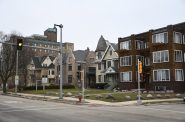 Feb 18th, 2024 by Jeramey Jannene
Feb 18th, 2024 by Jeramey Jannene


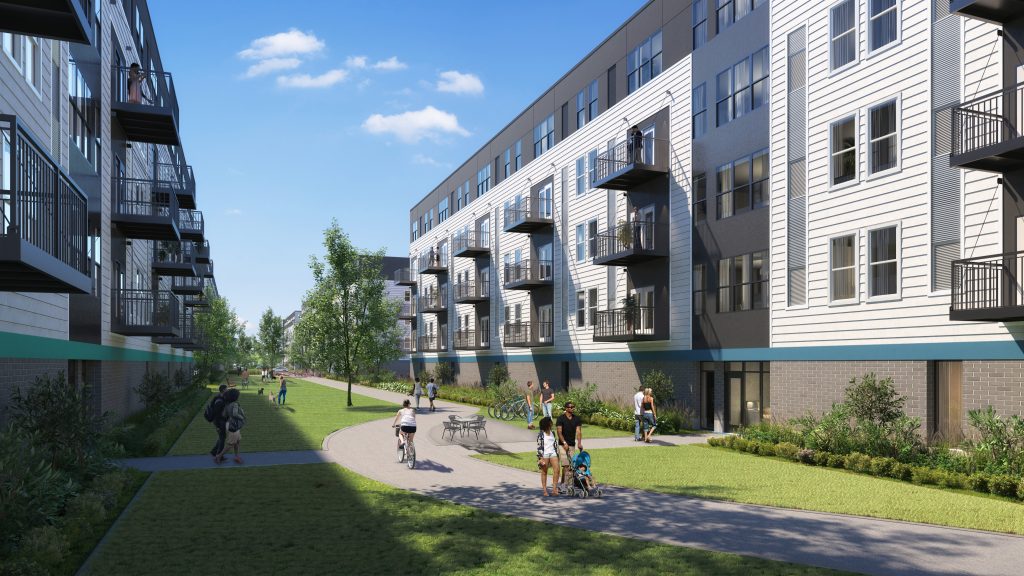
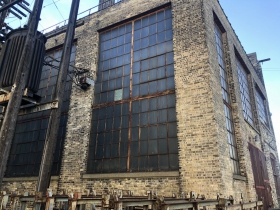
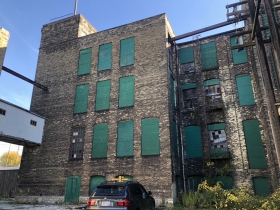
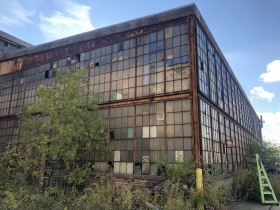
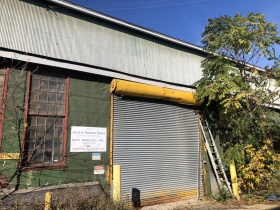
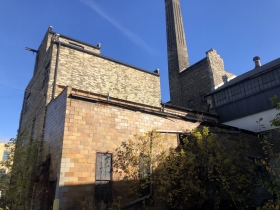
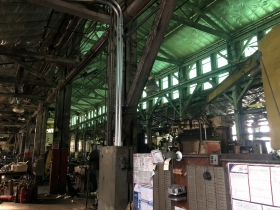
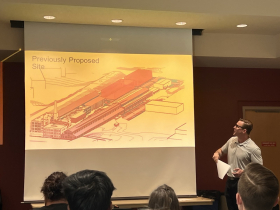
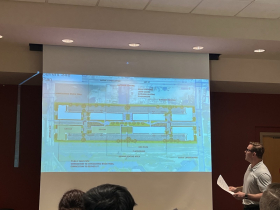
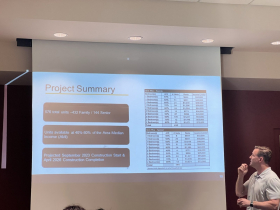
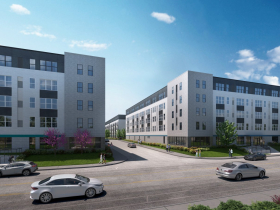
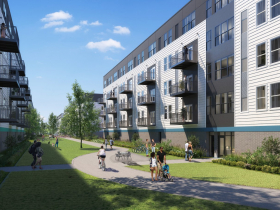



















$9 Million To Huge Bay View Development
“…something should happen there. It’s better than vacant land.”
Looks like a good way to squander yet another opportunity to support significant jobs on a site having access to rail service, heavy load-bearing foundations and high-capacity connections to utilities.
I don’t know what the total need for subsidized housing
is, nor do I know how units are distributed throughout
the metro area. But is it wise to establish so many units
in one place, rather than distribute them
in smaller clusters more widely?
How many subsidized units are already in place
in the comparably-sized combined developments
in the blocks immediately east of the railroad tracks?
Subsidized housing serves a crucial need.
It should be done right and well.
If this development does not properly serve the need,
or if industrial development is outside the purview
of the owners, perhaps a land swap would bring a
win-win result.
We definitely need more subsidized housing, so I am glad to see this going up in such a nice area. I am surprised however, that a 1 bedroom apartment at 80% is $1394! That’s crazy! That is more than I am paying for my 2 bedroom. Bay View, and many areas are getting so expensive. I lived there for 20 years and had to move to due high costs. It’s sad that these high rents these days are causing people to be homeless, young people to remain dependent on parent’s housing much longer, and seniors having to take in their children or grandchildren and/or live in subpar housing.